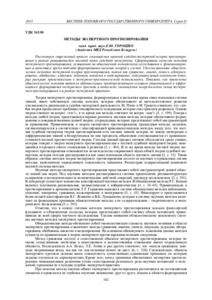Please use this identifier to cite or link to this item:
https://elib.psu.by/handle/123456789/13118Full metadata record
| DC Field | Value | Language |
|---|---|---|
| dc.contributor.author | Горошко, Е. Ю. | - |
| dc.date.accessioned | 2015-08-17T09:34:49Z | - |
| dc.date.available | 2015-08-17T09:34:49Z | - |
| dc.date.issued | 2015 | - |
| dc.identifier.citation | Вестник Полоцкого государственного университета. Серия D, Экономические и юридические науки. - 2015. - № 6. – С. 182-184. | ru_RU |
| dc.identifier.issn | 2070-1632 | - |
| dc.identifier.uri | https://elib.psu.by/handle/123456789/13118 | - |
| dc.description | Methods of Expert Forecasting. E. Goroshko | ru_RU |
| dc.description.abstract | Рассмотрен современный процесс становления частной судебно-экспертной теории прогнозиро вания в рамках развивающейся молодой науки судебной экспертизы. Сформирована система методов экспертного прогнозирования, основанная на общенаучной методологии исследования и функционирующих в настоящее время подходах формирования частных теорий и учений. Уделено внимание общелогическим методам экспертной теории прогнозирования, таким как сравнение, анализ, синтез, абстраги рование, обобщение, индукция, дедукция, аналогия и моделирование, содержательный компонент которых раскрыт применительно к экспертно-прогностической деятельности. Показано, как применение общелогических методов является обязательным предопределяющим условием рационального и эффективного формирования экспертного прогноза в контексте становления теоретических основ экспертного прогнозирования и в рамках экспертной практики.= Modern process of formation of the private judicial and expert theory of forecasting within developing young science of judicial examination is considered. The system of methods of expert forecasting, based on general scientific methodology of research and approaches of formation of private theories functioning now and doctrines is created. The attention to general-logical methods of the expert theory of forecasting, such as is paid: comparison, the analysis, synthesis, abstraction, generalization, induction, deduction, analogy and the modeling, which substantial component it is opened in relation to expert and predictive activity. It is shown how application of general- logical methods is an indispensable predetermining condition of rational and effective formation of the expert forecast in a context of formation of theoretical bases of expert forecasting, and within expert practice. | ru_RU |
| dc.language.iso | ru | ru_RU |
| dc.publisher | Полоцкий государственный университет | ru_RU |
| dc.relation.ispartof | Веснік Полацкага дзяржаўнага ўніверсітэта. Серыя D, Эканамічныя і юрыдычныя навукі | be_BE |
| dc.relation.ispartof | Herald of Polotsk State University. Series D, Economics and law sciences | en_EN |
| dc.relation.ispartof | Вестник Полоцкого государственного университета. Серия D, Экономические и юридические науки | ru_RU |
| dc.relation.ispartofseries | Серия D, Экономические и юридические науки;2015. - № 6 | - |
| dc.rights | open access | ru_RU |
| dc.subject | Право | ru_RU |
| dc.subject | Криминалистика (методология) | ru_RU |
| dc.subject | судебно-экспертная деятельность | ru_RU |
| dc.subject | экспертное прогнозирование | ru_RU |
| dc.title | Методы экспертного прогнозирования | ru_RU |
| dc.type | Article | ru_RU |
| Appears in Collections: | 2015, № 6 | |
Files in This Item:
| File | Description | Size | Format | |
|---|---|---|---|---|
| 182-184.pdf | 175.5 kB | Adobe PDF |  View/Open |
Items in DSpace are protected by copyright, with all rights reserved, unless otherwise indicated.